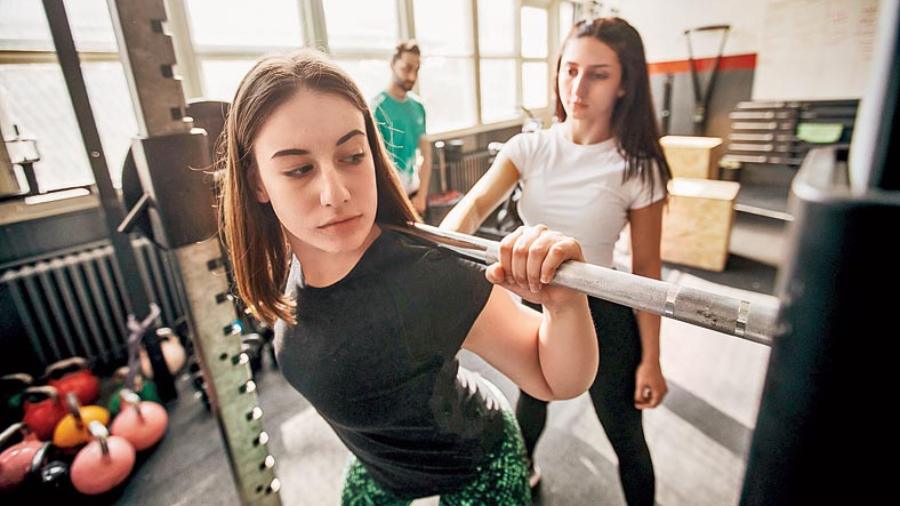Minerals are essential elements, existing naturally, that are found in foods. They are important to activate enzymes in our system for optimum growth and development of our body, which itself does not produce minerals. They are present in the soil, which in turn is absorbed by plants. It is necessary to have foods that are rich in minerals, otherwise one can consume multi-mineral tablets to supplement a diet deficient in minerals.
The major minerals are stored and used in our body in large quantities, hence the term ‘major minerals’, examples of which are magnesium, potassium, calcium, phosphorus, chloride, and sulfur.
Trace minerals are those that are essential to the body but in small quantities. Iron, zinc and manganese are a few examples. Though iron is categorised as a trace mineral, the amount truly required by the body exceeds other trace minerals.
Clinical research has often concurred that women often have difficulty in lifting weight progressively due to the paucity of iron in their body. They often experience chronic fatigue, prolonged muscle soreness, delayed recovery from physical stress. Being deficient in iron impeded their strength, stamina and power. As a result they showed poor improvement, often pushing them off the edge to simply not work out.
Being unable to manifest steady progress can be an overwhelming emotion, often giving rise to a sense of failure. Many feel demotivated, turning away from physical activity and their workout regimen. This could probably be attributed to being deficient in iron as opposed to having a weak determination. Low iron levels are typically found more in women than men owing to menstruation.

Seafood and green vegetables are in particular very high in iron. Increasing the consumption of nuts will help in boosting iron in the body
Time of consumption of iron supplements
The body requires iron for the production of haemoglobin that is responsible for the red pigment of our blood. The primary function of haemoglobin is to transport oxygen from the lungs and deliver it to all parts of our body. Iron is also required to produce myoglobin that carries oxygen to the muscles. Iron is also responsible for metabolising carbohydrates. Poorly metabolised carbohydrates due to low iron levels can cause an imbalance between insulin and sugar levels. It is therefore highly likely to feel fatigue more quickly and for longer duration if one is deficient in iron. Feeling cold, dizzy, extreme soreness are symptoms of being low in iron.
Iron is very important for women as they lose a substantial amount of iron during menstruation. Chronic iron deficiency gives way to anaemia, a condition where there are insufficient red blood cells or the size of the red blood cells are too small. The red blood cells are primarily responsible for carrying oxygen all over the body, simultaneously filtering out carbon dioxide. Insufficient iron levels make it difficult for red blood cells to function and regenerate themselves.
Athletes have a tendency to be deficient in iron due to heavy sweating. According to a study published in Medicine & Science in Sports & Exercise, 50 per cent women athletes were deficient in iron. While training, on the one hand, increases red blood cell production, it simultaneously increases the requirement of iron to function optimally and support the increase in red blood cell count.
Red blood cells typically break down faster in athletes due to the surge in oxygen intake and increased blood circulation. When this carries on for over a long duration of training, one experiences fatigue easily, breathlessness, failure to retain body warmth, resulting in muscles sprains and cramps. Often warming up prior to the exercise routine and retaining the warmth for ease of blood circulation can prove to be a challenge. These symptoms are easily mistaken as not being determined to have a good workout, whereas in reality it simply points to deficiency in iron.
It is crucial to be aware of the time of consumption of iron supplements. Often, exercise-related inflammation hinders the complete absorption of iron. A hormone, namely hepcidin, is released in the body shortly after a session of exercise, on an average three-six hours post-workout. This spike of the hormone subsequent to an increase in exercise-induced inflammation prevents iron to be optimally absorbed in the blood. It is suggested to consume one’s daily iron requirements in the morning for those who work out in the evening. Individuals who work out in the morning, it is recommended to consume the daily need for iron after lunch or before dinner.
Consuming iron-rich food is recommended for those who are hesitant to resort to supplements. Seafood and green vegetables are in particular very high in iron. Increasing the consumption of nuts will help in boosting iron in the body. It can take two-three weeks of taking iron supplements and/or iron-rich food for the body to reach an optimal iron level. Depending on one’s iron requirement, it may take up to 90 days to feel an increase in one’s energy.
A blood test (Serum Ferritin) is done to keep a routine check of one’s iron level. The normal range for blood ferritin for men is 24 to 336 micrograms per litre and for women it’s 11 to 307 micrograms per litre, though the reference range will be clearly mentioned in the report.

Anwar Wahhab is a metabolic analytic practitioner and strength and conditioning coach
